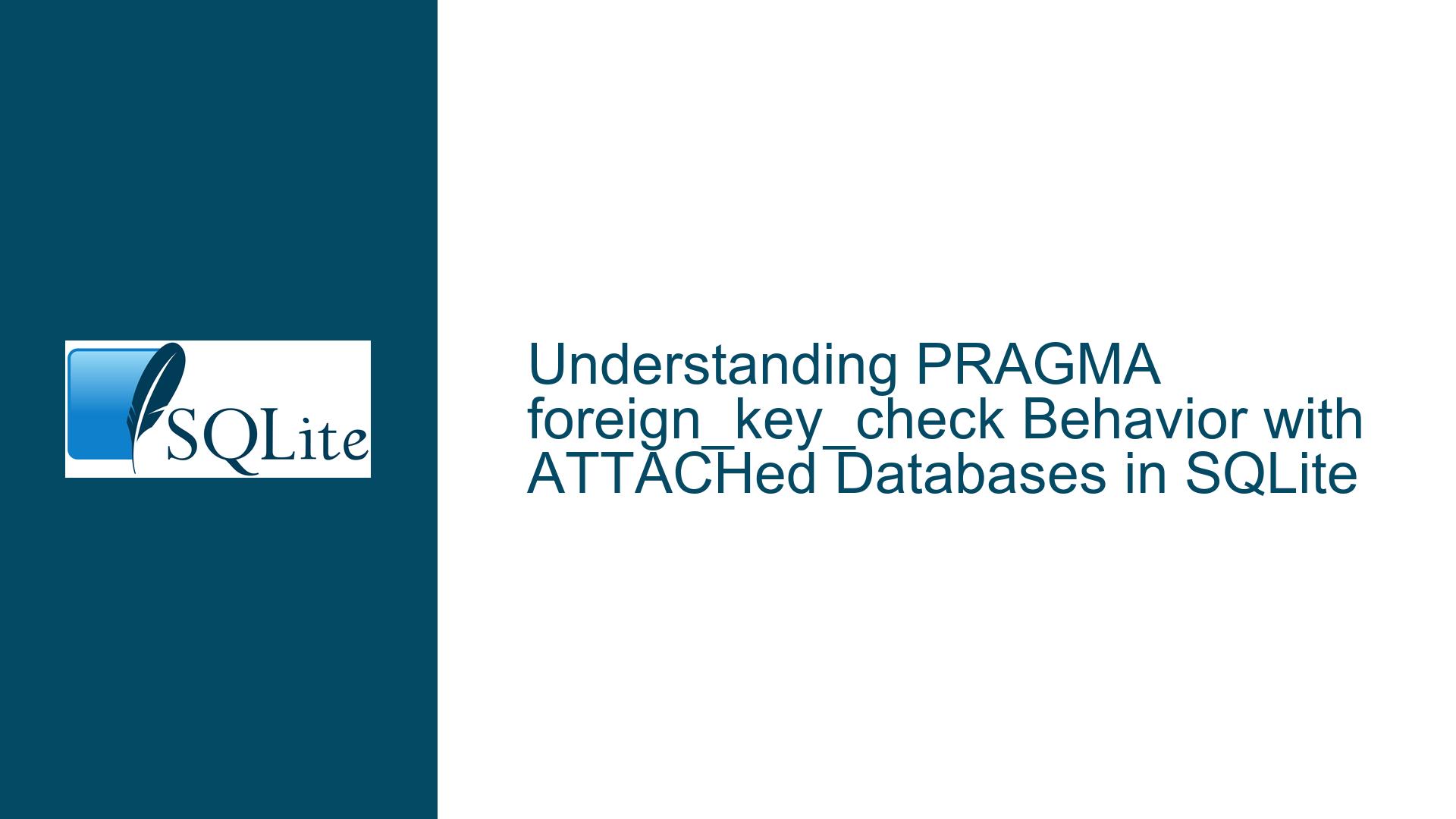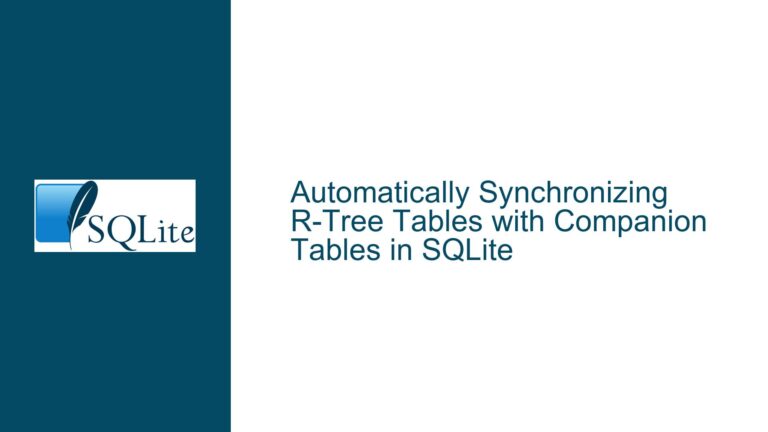PRAGMA foreign_key_check Behavior with ATTACHed Databases in SQLite
Issue Overview: PRAGMA foreign_key_check Inconsistencies with ATTACHed Databases
When working with SQLite databases, the PRAGMA foreign_key_check command is a critical tool for ensuring referential integrity by identifying foreign key violations. However, its behavior becomes nuanced and potentially misleading when multiple databases are attached to a single connection using the ATTACH command. This issue arises due to the way SQLite handles foreign key constraints across different schemas (databases) within the same connection.
In the provided scenario, two databases, db1.db and db2.db, are created with specific tables and foreign key relationships. The db1.db contains a table tb1 with a primary key column pk, while db2.db contains a table tb2 with a foreign key column fk referencing tb1(pk). The foreign key relationship is defined with ON UPDATE CASCADE and ON DELETE CASCADE to ensure automatic updates and deletions in tb2 when tb1 is modified. However, the foreign key constraints are initially created with PRAGMA foreign_keys = OFF, meaning they are not enforced during the initial data insertion.
When db2.db is attached to a connection opened with db1.db, the PRAGMA foreign_key_check command behaves inconsistently depending on whether it is run globally or targeted at a specific table. For instance, when tb2.fk contains a value that does not exist in tb1.pk, a global PRAGMA foreign_key_check returns no rows, suggesting no violations, while a targeted PRAGMA foreign_key_check(tb2) correctly identifies the violation. This discrepancy highlights a critical limitation in SQLite’s handling of foreign key checks across attached databases.
Possible Causes: Cross-Schema Foreign Key Limitations and PRAGMA Behavior
The root cause of this issue lies in SQLite’s handling of foreign key constraints across different schemas (databases) within the same connection. SQLite treats each attached database as a separate schema, and foreign key constraints are not automatically enforced across these schemas. This behavior is documented in SQLite’s official documentation, specifically in section 6.4 of the Foreign Key Support page, which states that foreign keys cannot cross schema boundaries.
When PRAGMA foreign_key_check is executed without specifying a schema, it defaults to checking only the main schema (the primary database opened in the connection). This explains why the global PRAGMA foreign_key_check fails to detect foreign key violations in db2.db when db2.db is attached as a secondary schema. The command does not inherently check all attached schemas unless explicitly instructed to do so.
Additionally, the behavior of PRAGMA foreign_key_check is influenced by the state of PRAGMA foreign_keys. If PRAGMA foreign_keys is set to OFF during the creation of the tables and insertion of data, foreign key constraints are not enforced at the time of data modification. However, when PRAGMA foreign_keys is later set to ON, the constraints are enforced for subsequent operations, but existing violations may not be detected unless explicitly checked using PRAGMA foreign_key_check.
The table-valued function variation of PRAGMA foreign_key_check, as suggested by Donald Griggs, provides a more comprehensive approach to checking foreign key violations across multiple schemas. By using pragma_foreign_key_check(NULL, 'schema_name'), it is possible to explicitly check each attached schema for violations. However, this approach requires manual intervention and is not as seamless as a global foreign key check that spans all attached databases.
Troubleshooting Steps, Solutions & Fixes: Ensuring Consistent Foreign Key Checks Across ATTACHed Databases
To address the inconsistencies in PRAGMA foreign_key_check behavior when working with attached databases, the following steps and solutions can be implemented:
Explicit Schema Specification in PRAGMA Commands: When using
PRAGMA foreign_key_check, always specify the schema name to ensure that the command checks the correct database. For example, usePRAGMA db2.foreign_key_checkto check thedb2schema explicitly. This approach ensures that foreign key violations in the attached database are not overlooked.Using Table-Valued Function for Comprehensive Checks: Leverage the table-valued function variation of
PRAGMA foreign_key_checkto perform checks across all attached schemas. The following query can be used to check foreign key violations in both themainanddb2schemas:SELECT * FROM pragma_foreign_key_check(NULL, 'main') UNION ALL SELECT * FROM pragma_foreign_key_check(NULL, 'db2');This query combines the results of foreign key checks from both schemas, providing a comprehensive view of any violations.
Refactoring Application Logic to Handle Cross-Schema Constraints: Since SQLite does not natively support cross-schema foreign key constraints, refactor the application logic to enforce referential integrity manually. This may involve implementing custom checks and validation routines that ensure foreign key relationships are maintained across attached databases. For example, before inserting or updating records in
tb2, the application can verify that the correspondingfkvalue exists intb1.Enabling Foreign Key Constraints During Data Modification: Ensure that
PRAGMA foreign_keysis set toONduring data modification operations to enforce foreign key constraints at the time of insertion or update. This prevents the introduction of foreign key violations and reduces the need for subsequent checks usingPRAGMA foreign_key_check.Database Design Considerations: When designing databases that will be used in a multi-schema environment, consider consolidating related tables into a single schema to avoid cross-schema foreign key limitations. If this is not feasible, document the limitations and implement robust application-level checks to maintain data integrity.
Testing and Validation: Thoroughly test the database and application logic to ensure that foreign key constraints are correctly enforced and that any violations are promptly detected and addressed. Use a combination of
PRAGMA foreign_key_checkand custom validation routines to validate the integrity of the data across all attached schemas.
By following these steps, developers can mitigate the limitations of PRAGMA foreign_key_check when working with attached databases in SQLite and ensure consistent enforcement of foreign key constraints across all schemas. While SQLite’s handling of cross-schema foreign keys presents challenges, careful design and proactive validation can maintain data integrity and prevent inconsistencies.





